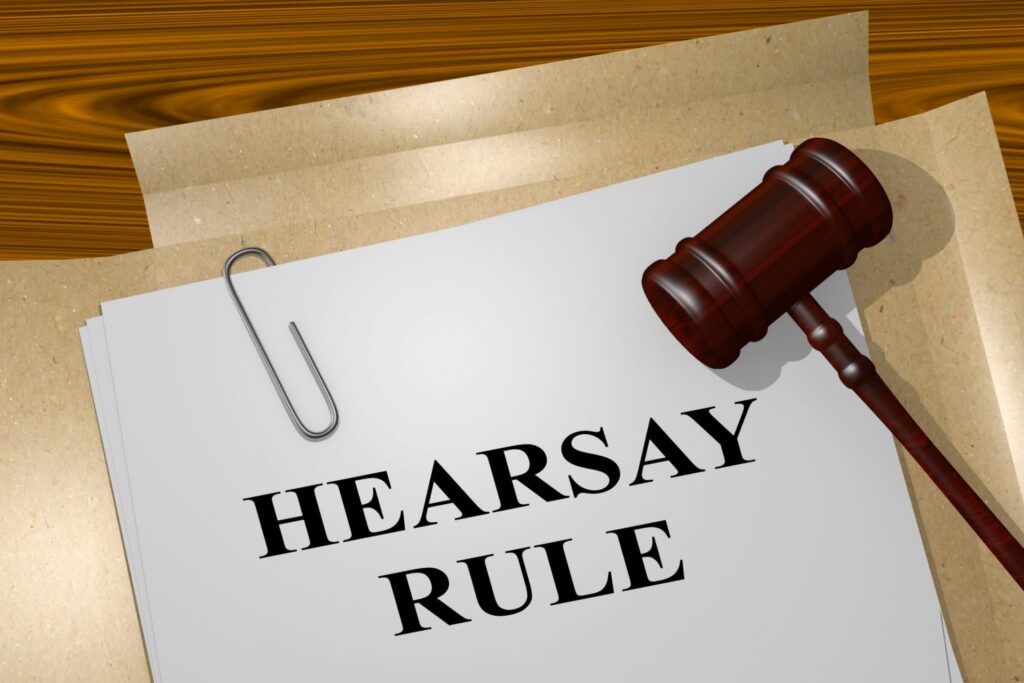Non-lawyer friends and family will often approach me and ask me to parse through hypothetical legal situations to further understand my line of work. When discussing trials, they are very familiar with the word “hearsay,” thanks to shows like Law and Order, but do not understand what it is, and why we lawyers object to it. To ensure a fair process for everyone involved, the courts do not want people testifying to what they heard from someone else to show that what that person said is the truth. This is why hearsay evidence is not allowed in Court.
The Maine Rules of Evidence 801 explains that Hearsay is a statement made by someone not currently testifying that is used to prove that the statement is the truth. For example, you are on the witness stand and you are telling a jury that your friend told you that she saw a guy break into the local gas station. You are talking about a statement (“I saw someone break into the gas station”) made by someone who is not currently testifying (your friend) to prove that someone did in fact break into the local gas station. This is hearsay. You testifying about what your friend said would not be admissible in Court under the rule of hearsay. The Court would allow your friend to testify that she saw someone break into the gas station. The Court has a problem with you testifying as to what your friend said, because it does not allow the two sides to test your friend’s credibility. Without your friend there, they need to take your friend’s statement at face value, without the ability to determine if your friend was lying at that moment in time, or could have perceived what she says she saw.
Another example makes hearsay even more complicated. You are on the witness stand and you testify that you previously told police a year ago that you saw someone breaking into a gas station. You are testifying about a statement you made to law enforcement to prove that someone broke into the gas station. This is hearsay, even though you are testifying to what you told someone. The jury is unable to assess your credibility at the time you made the statement a year ago, so you cannot testify that you made the statement to prove that someone broke into the gas station. Hearsay is a statement made outside of current testimony, so your statement about the gas station break-in is inadmissible as hearsay. You can testify that you saw someone break into the gas station, but you cannot testify that you told police that you saw someone break into the gas station.
There are some “out of court” statements that the Court has explicitly said are not hearsay. One is any statement supposedly made by one of the two parties at trial. This would be a statement by the Plaintiff or Defendant in a civil case, or by a Defendant in a criminal trial. One of the biggest purposes of a jury is to assess the credibility of either side of the case, so the problems that hearsay evidence bring about the credibility of the person who made the statement is solved by an overall assessment of credibility. Another “out of court” statement that is not hearsay is a prior sworn statement (made it under oath) made by the person currently testifying when what they are currently saying is inconsistent with what they previously said at the other time. Because that person made the statement under oath, the Court will allow a jury to infer that the previous statement is the truth, even if the same person is currently saying something different. If the person made the prior, inconsistent statement not under oath, it can only be used to tarnish the person’s credibility. A jury is not allowed to automatically assume the first statement is the truth unless it was made under oath.
; There are several exceptions that allow hearsay evidence into trial, but generally, hearsay evidence is inadmissible at trial. The exceptions are complicated and numerous, but criminal defense attorneys are well versed in the exceptions. The whole issue with hearsay is the inability to assess the credibility of the person making the statement. If you are facing criminal charges, and are worried about hearsay evidence affecting your defense, contact the attorneys of The Maine Criminal Defense Group immediately to schedule a consultation.


